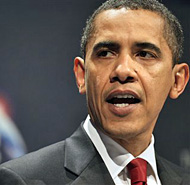World economic powers reach deal to combat crisis
 London - The world's biggest economic powers reached a deal Thursday aimed at forging a new global financial order and shielding poor countries from the fallout from the economic downturn by boosting funds for international organizations by more than 1 trillion dollars.
London - The world's biggest economic powers reached a deal Thursday aimed at forging a new global financial order and shielding poor countries from the fallout from the economic downturn by boosting funds for international organizations by more than 1 trillion dollars.
After seven hours of tough wrangling over how to tackle the global recession, the Group of 20 (G20) of the world's most advanced and emerging economies pledged in their communique "to do whatever is necessary to restore confidence, growth and jobs."
Speaking at a press conference Thursday winding up his first major foray onto the world stage, US President Barack Obama hailed the summit as taking "unprecedented and co-ordinated action" to face up to the recession.
But agreeing to an overhaul of the financial system helped to paper over differences that emerged at the summit, with the G20 leaders stepping back from expected plans to announce additional fiscal measures to spur global growth.
Instead, the G20 signed off on steps aimed at greater market supervision and closing off the gaps in the regulatory system in an effort to avoid future crises by bringing market rules into line with the changes unleashed in recent years by fast-paced globalization.
Under the accord hammered out in London, the G20 leaders agreed to give the International Monetary Fund (IMF) more financial firepower, raising the organization's resources by 500 billion dollars to 750 billion dollars.
The extra financing is designed to enable the IMF to better help developing countries engulfed by economic crises.
The G20 leaders also agreed to a 250-billion-dollar plan to shore up global trade in the face of the dramatic slide in the economy.
Another 100 billion dollars is also to be made available to the World Bank and a group of development banks, including the Asian Development Bank.
Emerging economies represented at the G20, such as China, have been pressing for an overhaul of the world's top financial institutions as part of an effort to loosen the grip of the United States and other advanced nations on bodies such as the IMF.
A planned review of the IMF and the World Bank is also likely to include China's call for a new IMF reserve currency, British Prime Minister and G20 host Gordon Brown said.
"The global crisis is hitting emerging market and poor countries hard," said IMF managing director Dominique Strauss-Kahn.
"The G20 leaders have today sent a powerful signal that the international community is committed to support these countries, including by ensuring that the IMF has the resources available."
Ending what had been a tough round of negotiations at the summit on how to haul the world economy out of its downturn, Brown said the leaders vowed "to prevent a crisis
(like this) happening again."
However, at one point during the summit it appeared that the differences might be unbridgeable with officials returning to their hotels and leaving the leaders to write the final statement, delegation sources said.
"We have turned the page," said French President Nicolas Sarkozy. "There have been moments of tension but we never thought we could reach such a big agreement."
The G20 leaders also agreed to a clampdown on tax havens and the hedge fund industry, estimated to be worth about 1.6 billion dollars. They also agreed to stepped-up supervision of credit rating agencies.
Along with this, the leaders are likely to sign off on a plan to establish a new monitoring system, a so-called global "college of supervisors," that would mirror the cross-border activities of the world's largest financial institutions.
As part of strengthening the global market structure, the leaders also plan to replace the existing Basel-based Financial Stability Forum, which brings together global market regulators, with a new Financial Stability Board with a beefed-up mandate.
"Major failures in the financial sector and in financial regulation and supervision were fundamental causes of the crisis," the leaders said in their statement.
But the scale of the changes means that the summit represents only a step along the path to an overhaul of the global financial system with another meeting already being planned for later this year in New York.
The leaders also issued another stern warning about the threat posed by protectionism and the risks from global warming. They also called for efforts to reactivate a stalled round of talks on world trade.
Thursday's meeting represented only the second time that the G20 leaders have met since the organization was formed two decades ago.
Nevertheless, the G20 accord helped to boost the mood of global investors, with world stock markets chalking up hefty increases on the back of the summit agreement.
This was despite a steady stream of grim economic data, with figures released this week showing the recession tightening its grip on Japan, the US and Europe.
Comprising nations such as Britain, the United States, Germany and France as well as India, China and Brazil, the G20 represents about 85 per cent of world economic activity.
The G20 powers also addressed the anger generated by big bonus payments to bankers who were often seen as being at the heart of the financial crisis, which was triggered by a meltdown in the US mortgage market. This involves recommending new global rules for the remuneration of top managers. dpa